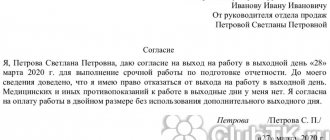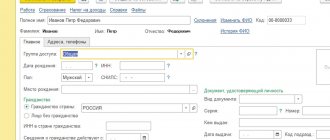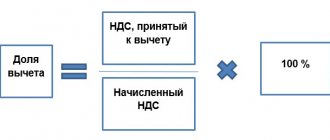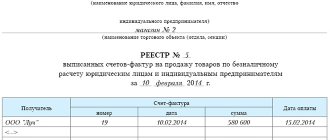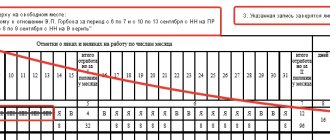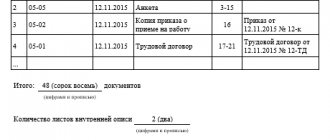According to the Labor Code of the Russian Federation, an employee has the right to ask the employer in writing to establish a part-time working week for him. The parties can reach an agreement, so the length of the student’s working week will be any. If the student is a minor, then according to Art. 92 of the Labor Code of the Russian Federation, he must work no more than 35 hours a week. Personnel nuances When registering students for work, there are some personnel nuances. They need to be taken into account. Otherwise, problems with the labor inspectorate cannot be avoided during the next scheduled or unscheduled inspection. Hiring a Full-Time Student Full-time students have the same rights and responsibilities at work as “essential” employees. A full-time employee has the right to demand a part-time work week. Hiring of a full-time student takes place in accordance with the norms of the Labor Code of the Russian Federation.
Labor Code (minor, pregnancy, etc.).
Does an organization have the right to hire a full-time student full-time?
Registration of labor or civil law relations is carried out as with all other employees. More details in the System materials: 1. Answer: Is it possible to hire a full-time student who is studying full-time?
Work and school hours coincide during the day. Yes, you can. The legislation does not establish restrictions on the possibility of a student working during study hours.* At the request of an adult student and with the consent of the employer, an employee may be assigned part-time or flexible working hours (Article 93, Part 1 of Article 102 of the Labor Code of the Russian Federation) . When hiring a minor student, the employer is obliged to establish a reduced working time - no more than half the norm established for employees of the corresponding age (Part 2 of Article 92 of the Labor Code of the Russian Federation).
Applying for a student's job
Labor Code of the Russian Federation); - for communications employees Regulations approved by Order of the Ministry of Communications of Russia dated September 8, 2003 No. 112. Establishment of a flexible working time regime in a department To introduce such a regime for certain categories of employees, for example, an entire division of an organization, specify the application of the flexible working time regime in the Labor Regulations (Part 1 of Article 100, Part 4 of Article 189 of the Labor Code of the Russian Federation). Establish a summarized accounting of working hours for employees working in flexible working hours, if the daily or weekly working hours provided for this category of employees cannot be observed (Part 1 of Article 104 of the Labor Code of the Russian Federation). The procedure for applying summarized accounting is specified in the Labor Regulations (Part 3 of Article 104 of the Labor Code of the Russian Federation).
https://youtu.be/NCLqm4L9VsM
Hiring a student - documents
Info
There are no prohibitions or restrictions in labor legislation on university students combining work with full-time study. Therefore, any enterprise has the right to hire such employees, including full-time ones. Hiring a full-time student should be carried out on a general basis, guided by Chapters 10 and 11 of the Labor Code of the Russian Federation.
Many students go to work in their specialty during their studies in companies of their choice, not only in order to earn themselves additional money, but also with the prospect that they will be able to remain in this company after graduation. At the same time, they will already have some experience working in this company, and they will be able to get a promotion faster.
Risks for the employer
When hiring a student, the employer faces certain risks:
- The student will leave for the session - he will be absent from the workplace. To perform his duties, you will need to find another employee who will have to pay extra for temporary work. In addition, the student must pay for the vacation. The employer “loses” financially.
- The student has no work experience - he will learn theory and gain practice “without leaving the cash register” - right at the workplace. The speed and quality of work performed by such an employee is quite questionable.
- A student is not the most reliable employee, since he is young and enthusiastic. It may happen that he quits the job without finishing it.
How many hours can an adult full-time student work?
Its content must fully comply with the employment contract signed with this employee. The issued order should be familiarized to the student employee against signature within three days from the moment he began to perform his duties at the workplace. At the request of this employee, the personnel service must issue him a copy of this order, certified accordingly. Registration of a work book For a full-time student for whom this is the first place of work, the personnel service of the enterprise must issue a work book (Part 4 of Article 65 of the Labor Code of the Russian Federation). Registration must be completed within five days from the day the student employee was hired.
Full-time training and official employment: the main thing
We would like to immediately please those students who want to work officially - there is no prohibition on this in the current labor legislation. The employer has the right to hire students regardless of the form of study, i.e. Both full-time and part-time students can get a job (full-time).
In addition, the law not only does not provide for any prohibitions for full-time students, but, on the contrary, certain guarantees are enshrined (we will discuss them below). The procedure for hiring a student is no different from hiring other employees. As a rule, to get a job you will need:
- successfully pass the interview;
- to write an application;
- sign an employment contract;
- wait for the order to be issued;
- begin to perform your duties.
If you are getting a job for the first time, the employer will keep a work record book for you. In addition, if you do not have SNILS, you will need to issue one. You also need to pay attention that the full-time employee being hired must necessarily read the order (this must be done within 3 days from the start of work).
Important! With students studying full-time, the employer has the right to enter into both a fixed-term and an open-ended employment contract. The possibility of concluding a fixed-term contract with a full-time student is expressly provided for in Art. 59 of the Labor Code of the Russian Federation.
Official employment for students has one more advantage (besides experience and earnings). If you get a job in your specialty, during your senior years of study you will have the right to apply for free attendance at a university. Free attendance allows you not to worry about sanctions from the educational institution for missing classes.
Once you receive the consent of the university to attend freely, your main task will be to pass tests and exams on time, and it will not be necessary to attend all classes.
How to hire a full-time student
Guarantees and compensation If a full-time working student receives his education at a state-accredited university for the first time, then guarantees are provided for him to provide the necessary leave without pay for his studies (Article 173 of the Labor Code of the Russian Federation):
- when passing intermediate certification -} 15 calendar days per academic year,
- when preparing and defending a final qualifying thesis, as well as passing final state exams —} 4 months,
- when passing final state exams -} 1 month.
If a working student studies at a university without state accreditation, then such guarantees can be stipulated in the student’s employment contract or in the collective agreement of the company where he works.
Features of providing guarantees and compensation
It is important to note that in accordance with Art. 177 of the Labor Code of the Russian Federation, guarantees and compensation for employees combining work with training are provided when receiving education at the appropriate level for the first time. However, an employee who is not receiving education at the appropriate level for the first time is not provided with guarantees and compensation unless the parties stipulate their provision in the relevant agreements (in an employment contract, in a collective agreement). The same position is confirmed by the Determination of the Constitutional Court of the Russian Federation dated 04/08/2004 No. 167-O: the norm of the Labor Code of the Russian Federation establishing the corresponding condition does not prevent the solution of the issue of guarantees and compensation for employees receiving a second higher education within the framework of collective-contractual and individual-contractual regulation and does not excludes the employer's obligation to provide such employees with benefits in connection with training, if this is provided for in a collective agreement or agreement between the employee and the employer.
Guarantees and compensations provided by the employer to employees are differentiated depending on the level of education (higher, secondary vocational) and type (full-time, part-time) and consist of granting study leave with or without pay. Another type of preference that an employer can provide to a student is reduced working hours in cases and under conditions provided for by labor legislation.
Hiring a student
In this case, the employee will need to work the appropriate number of working hours in certain accounting periods (day, week, month, etc.) (Article 102 of the Labor Code of the Russian Federation). Basically, working hours as well as rest time for full-time working students are negotiated by agreement of the parties for each employee individually. And if it does not coincide with the general rules adopted by a given employer, then this must be stipulated in the employment contract (Art.
57 Labor Code of the Russian Federation). If a student, under the terms of an employment contract, is established on a part-time working schedule, then this fact does not affect either the duration of his annual basic paid leave or the accounting of his work experience and does not entail any other restrictions on his labor rights (Part 3 of Article 93 of the Labor Code of the Russian Federation ). Order of admission Hiring a full-time student must also be issued by order (Form No. T-1).
Peculiarities
Labor relations with persons who are studying at a university are characterized by a number of features that the employer must take into account.
- Indicating a probationary period in an employment contract for a minor employee is prohibited, in accordance with Art. 70 Labor Code of the Russian Federation;
- Art. 93 of the Labor Code of the Russian Federation gives employers the obligation to establish a reduced work schedule for employees under 18 years of age;
- By mutual agreement between the parties to the employment contract, a shortened work week, as well as a short working day, can also be established in relation to an adult student;
- In case of reduced work hours, wages are calculated based on the actual time worked;
- In most cases, students' working hours are shortened. This condition must be reflected in the employment contract;
- The specifics of establishing a work schedule for students are not grounds for changing the duration of legal leave, length of service, etc.
Employment of a full-time student
Important
Home/Hiring/Students The desire not to depend on parents and the need for money forces the student to look for a job. For an employer, cooperation with this category of citizens is associated with a number of features. A student's employment must take into account the form of study.
If a person is a full-time student at a university, a standard employment contract cannot be concluded. The process must be carried out in accordance with the norms of the Labor Code of the Russian Federation. Labor Code of the Russian Federation Peculiarities of interaction between employee and employer in the Russian Federation are regulated by the Labor Code.
The rules for drawing up an agreement with an employee are reflected in Chapters 10-11. In accordance with Article 59 of the Labor Code of the Russian Federation, if a student is studying full-time at a university, the employer can only enter into a fixed-term contract with a potential employee. This is due to the fact that usually full-time students only want to find a part-time job for the summer.
Trainee
Getting an intern to work for a company is in some sense beneficial for the employer. This will allow the employer to provide itself with highly qualified employees in the future, but it is also possible that the company will need a trainee driver.
It is worth noting that there is a widespread practice of concluding agreements between organizations and educational institutions. On their basis, students of universities and secondary educational institutions have the opportunity to undergo practical training on the territory of large enterprises and organizations.
Cooperation with an intern is characterized by a number of features:
- The duration of the internship is set in accordance with the plan adopted by the educational institution.
- It is the responsibility of the company management to conclude a fixed-term employment contract with the intern. The period for which it is concluded cannot exceed 6 months (Article 59 of the Labor Code of the Russian Federation).
- The fact of the internship must be entered in the student’s work book.
- The organization must provide the trainee with an experienced mentor or mentors.
- Successful completion of the internship ends with the student receiving a certificate of internship in this company.
Hiring a full-time university student
For this category of student workers, a reduced working time is established - no more than 18 hours per week. At the request of the student worker and with the consent of the employer (Article 93 of the Labor Code of the Russian Federation), the student worker may be assigned part-time working hours, namely: part-time work (in case of a decrease in the number of hours of work per day compared to what is established in the organization by routine or schedule, for example, instead of 8 hours - 3), or part-time work week (in case of a decrease in the number of working days). It is also possible to establish a part-time working week with part-time work (for example, 3 working days a week, 3 hours each).
Hiring a full-time university student
But girls are not far behind guys when they get jobs where hourly schedules with hourly wages predominate. It is easiest for evening or part-time students to get a job, but as practice shows, full-time students also manage to combine classes, seminars and sessions with part-time work in their free time. Naturally, this happens mainly in the evening and at night, but when money earned by their own labor is at stake, students go for this combination option. The question immediately arises that without various relaxations and benefits, such a rhythm (combining work with training) will be very difficult. Therefore, for working students, benefits are legally established in the Russian Federation to help them stay on track. A complete list of benefits for students in Russia can be found here.
If we pay attention to the data from sociological surveys, we will see that the percentage of working students out of the total number tends to 50%. This means that every second guy or girl combines mastering a future profession with earning money. Moreover, of these 50%, only a small part works in the profession in which they are studying at the university, while the majority of students prefer hourly part-time jobs in order to have pocket money, which is always in short supply, and not every student has the opportunity to receive a scholarship.
Of course, a more useful type of work for the student himself, first of all, is work in the specialty that he will master upon graduation from university or institute. After all, within the walls of an educational institution you can only obtain theoretical knowledge. And the simultaneous application of theory in practice (at the place of work/part-time work) in the future will turn the still student into a highly qualified specialist. Any profession requires the acquisition of practical skills. And here there is a huge advantage from combining work with study. For an ordinary student who devotes all his time to studying and does not find time to work, after graduating from university, it is very difficult not to get lost in the huge flow of information that will fall on his head every day when he goes to work. After all, no matter what profession a student acquires, in addition to theory and practice, it is also necessary to be able to establish working contacts with his colleagues. Perhaps, through team efforts, achieve the goals set by management. Therefore, a student working in his future profession is much more prepared for adult life, which will begin after defending his diploma project. And by the way, defending your thesis project, supported by the acquired practical knowledge, will be much easier.
Therefore, summarizing all of the above, we can say that if you are a student and decide to get a job, then it is best to look for it based on the specialty you receive at the university. This will make it easier to defend your thesis project and, after graduation, will give you much more prospects than for a student who is not working, or who works part-time wherever necessary.
But this issue also has a flip side, which concerns the employer taking on a certain risk when hiring a student. Firstly, the matter concerns a banal distrust of young people, whom any employer is skeptical about. Secondly, a working student is entitled to a number of benefits that will be to the detriment of production, that is, the employer. After all, even if the conditions for providing benefits to a student are unfavorable for the employer, he must strictly comply with the “letter of the law.”
If you have already got a job
First and most importantly, don't complain.
You will be proud of yourself. And, of course, sometimes you will want to be pitied.
We love to complain, and there's nothing wrong with that. Sometimes we just need it. But in this case, when you complain that you are “tired of combining work and study, it’s incredibly difficult for you, you don’t have enough time for your personal life and you really want to tell everything to hell,” think for a minute: you really want to be pitied ?
Do you want to be told something like: “Oh, you poor thing, you study and work! It must be hard for you, you don’t have any free time at all?” I bet this is not what you wanted at all. You dreamed of hearing: “Listen, what a great guy you are, you manage to do everything and cope with everything successfully! I’m proud of you / I envy you with white envy,” etc.
What you really want is not pity, but praise.
This is your true goal. You want people to recognize your achievements, you are proud of yourself and you want others to be proud of you too.
Of course, it seems strange to us: to approach a person and say that now I’m going to tell you how great I am, and you praise me. But try it at least once, and it will no longer seem immodest and unusual to you.
We all want others to recognize our achievements, to see what we have achieved, and there is absolutely nothing wrong with that.
Set your priorities
I got my first job the summer after I finished my third year. I studied well, rarely missed classes, and had no intention of lowering the bar any further. Studying has always been a priority, I never thought about it, but I always knew that if I one day had to choose between study and work, I would always choose the first.
It was my choice, although I know a dozen guys who dropped out of high school to work.
You must understand from the very beginning what is more important to you and what you will give up if circumstances force you to make a choice.
Plan your time
I was lucky in many ways: at my first job I had a free schedule, there was no need to be in the office every day from 9:00 to 17:00.
Work can be inconsistent
Except, of course, for one thing: despite the free schedule, I had to do all my work on time. I never considered myself a hyper-responsible person, but I always knew that I couldn’t fail to complete a task on time, no matter what it was: work or school.
Very often work and study played tug of war, and it turned out something like this:
And after a couple of weeks in the role of a zombie who falls asleep at 3:30 and gets up at 6:30, there is only one conclusion that can be drawn:
What happens if you sleep for 3 hours
I am a night owl, and it was not at all difficult for me to do work and study at night, but getting up in the morning was, to put it mildly, a little difficult. After I slept safely several times, simply because my exhausted body flatly refused to respond to the sound of the alarm clock, I realized that something needed to be changed.
Remember that health (both physical and mental) is one of our most valuable irreplaceable resources, and if you ruin it, then you will no longer have time to work or study. Set yourself a deadline: after 23:30 there is only rest and no study or work.
At first, it will be difficult for you to complete all your tasks by a certain deadline, but over time (it took me about two weeks) you will get used to it and will benefit: you will get enough sleep and relaxation, and at the same time you won’t have to worry about work or school work. tasks.
Is it worth telling at work that you are a student, and at school that you are working?
Telling your employer that you are a student is definitely worth it. Remember that during your studies you have sessions, serious classes that you cannot skip, or some important events, that is, in any case, there will be moments when you need to be present at the university during working hours. Don't forget that often you don't just work in a team - you work in a team, where a mistake or indifference on one can negate all the efforts and achievements of another.
But it is not always worthwhile to inform your students that you are working.
Many teachers have a negative attitude towards students’ secondary employment, believing that it will have a negative impact on their studies. A different opinion is often expressed by practicing teachers who work at an enterprise and teach specialized disciplines to you a couple of times a week. You can calmly ask such teachers to take time off from a class, and then fill in the gaps with additional speeches, reports, etc.
You know the morals of your teachers, so before you publicly announce that you are working, think about whether it will backfire on you later.
About vacation
Vacation
Try to take time off for a session if you feel it promises to be bloody. Having covered yourself with books, notes and tablets, trying to cram a ton of information into your poor head, you will push the work not even to the second, but to some fourth plan and then you will not clear out all the resulting rubble.
About the weekend
Weekend
Someone once said that “we make our own holidays.” The same can be said about weekends.
Each of us has moments when we realize that we are tired of everything, we don’t want anything and we need to rest. Ignoring such impulses threatens apathy and depression, so don’t get too carried away with weekends not according to the calendar, but arrange them for yourself when you feel an urgent need for it: take a day off from work and skip school. Spend your free time the way you want: sleep, walk or do what you like.
After such an unscheduled day off, you will gain strength and be able to work and study more productively.
Don't be afraid to ask colleagues for help
There's no shame in this. It’s good if you work in a department, and not as an independent, sole and irreplaceable specialist. Although in any case, remember that you can always find a way out. And a secret: many people like to help others, this is how they feel important and useful.
Forget about studying at work, and forget about studying at work
As soon as you crossed the threshold of your office, you ceased to be Ivanov from X-41 and Petrova from Y-52. You are an employee who works for a company. Once you are at the university, you cease to be an employee and become a student.
You shouldn’t be nervous about work while studying and try to conduct business negotiations during a 10-minute break. You shouldn’t bother yourself with academic problems at work. Everything has its place and its time.
Take a break from studying at work, and take a break from work while studying.
Remember you can stop at any time
You didn't sign the employment contract in blood. Nobody chained you to a desk at the university. This is your life, and you have the power to refuse at any time everything that you consider unnecessary.
ABOUT:
Having considered the issue, we came to the following conclusion: A person receiving full-time education has the right to combine study with work.
Rationale for the conclusion: According to part one of Art. 2 of the Labor Code of the Russian Federation, one of the principles of legal regulation of labor relations is freedom of labor, including the right to work, which everyone freely chooses or to which they freely agree. Discrimination in employment is prohibited. Everyone has equal opportunities to exercise their labor rights. No one can be limited in labor rights and freedoms or receive any advantages, regardless of gender, race, skin color, nationality, language, origin, property, family, social and official status, age, place of residence, attitude to religion, political beliefs, membership or non-membership in public associations, as well as other circumstances not related to the employee’s business qualities. The right to work can only be limited by federal law (Article 3 of the Labor Code of the Russian Federation).
Labor legislation does not contain a ban on combining work and full-time study. On the contrary, for example, paragraph nine of part two of Art. 59 of the Labor Code of the Russian Federation directly provides for the possibility of concluding fixed-term employment contracts by agreement of the parties, including with persons studying full-time. In addition, Art. Art. 173-177 of the Labor Code of the Russian Federation for persons combining work with training, additional guarantees are provided.
Thus, an employment contract can be concluded with a student studying full-time, either for a fixed-term period (part two of Article 59 of the Labor Code of the Russian Federation) or for an indefinite period. A similar opinion is shared by the representative of Rostrud I. Shklovets (see the answer to the question: “We want to conclude an employment contract with a full-time student. He has a certificate of transition to free attendance. Is it possible to conclude a full-time contract?”, (The contract is the basis labor relations (I. Shklovets, “Actual accounting”, N 8, August 2011)).
Therefore, a full-time student has the right to combine study with work.
With students who have reached the age of 18, an employment contract is concluded in the usual manner, as with other employees.
Answer prepared by: Expert of the Legal Consulting Service GARANT Naumchik Ivan
The answer has passed quality control
List of benefits for working students
State guarantees, benefits and compensation apply only to those working students who are receiving their first higher education. They are described in more detail in the Labor Code of the Russian Federation (Articles 173, 177). We will try to briefly and succinctly describe what benefits students are entitled to at work under current labor legislation.
Providing a working student with additional leave, with salary protection: If a student successfully combines work and study (meaning a report with grades), while studying at a university that has state accreditation, then he has the right to be granted additional leave in the following cases:
- When passing the intermediate certification, the student is entitled to a leave of 40 calendar days with salary retention in the Ι and ΙΙ courses, in addition, when mastering the main educational programs in a shortened time in the ΙΙ course, the additional leave may be not 40, but 50 days. For each subsequent course of study, the amount of leave does not change and is 50 calendar days;
- In order for a student to pass the final state certification, he must be given a leave of absence in the amount of 4 months, in accordance with the educational plan of the university.
It should also be noted that according to the Labor Code of the Russian Federation, regular annual leave can be added to additional leave or vice versa;
Leave for a working student without pay: the employer must provide the student with leave regardless of the work situation, but without pay in the following cases:
- for passing entrance exams to a university – 15 days;
- workers undergoing training in preparatory courses at the university where they plan to enroll, to pass certification based on the results of the course taken - 15 days;
- if a student is studying at a university that has state accreditation, and is a full-time student, then the employer is obliged to give unpaid leave of 15 days to pass the exam; 4 months – to prepare and defend the diploma project; 1 month – for passing state exams;
Travel compensation: If a working student successfully completes training at a state university, then, according to Article 173, Part 3 of the Labor Code of the Russian Federation, the employer must pay for the student’s travel to and from the educational institution once a year;
Reducing working hours: For a period of up to 10 months, before the date of passing the state final certification (applies only to students studying at universities that have state certification), the worker has the right to demand from the employer a reduction in the duration of the work shift. The reduction is made either every day for a certain time, or an additional day off is provided during the working week. Moreover, this time of “release” from work is paid at 50% of the amount.
Students who receive a salary subject to income tax (NDFL) and pay for their studies can contact the tax authorities to receive a tax deduction for their studies (the maximum deduction amount that can be returned is 15,600 rubles per year).
All of the above guarantees also apply to persons who receive education at the direction of the employer. This referral is issued to the employee by mutual agreement of the parties, in accordance with the employment contract in force between them.
If an employee simultaneously receives two higher educations, then all guarantees apply to only one of them.
When an employee receives a second higher education, but not in the direction of the employer, as well as when studying at a university that does not have state accreditation, the above benefits can be provided to the employee if this measure is provided for in the collective agreement of the enterprise, or in an additional agreement between the employee and the employer .
Guarantees and compensations for graduate students and equivalent students
In accordance with Art. 173.1 of the Labor Code of the Russian Federation, workers mastering training programs for scientific and pedagogical personnel in graduate school (postgraduate studies), residency programs and assistant internships through correspondence courses have the right to:
- annual additional leave at the place of work lasting 30 calendar days with preservation of average earnings. In this case, the time spent traveling from the place of work to the place of training and back is added to the employee’s annual additional leave while maintaining average earnings. The specified travel is paid by the employer;
- one day off from work per week with payment in the amount of 50 percent of the salary received. The employer has the right to provide employees, at their request, in the last year of study with no more than two additional days off from work per week without pay.
Employees who are mastering programs for training scientific and pedagogical personnel in graduate school (postgraduate studies), as well as persons who are applicants for the scientific degree of Candidate of Sciences, also have the right to be granted at their place of work an additional annual leave of three months to complete a dissertation for the scientific degree of Candidate of Sciences while maintaining average earnings.
Leave for applicants for the academic degree of Candidate of Sciences or Doctor of Sciences is granted in the manner prescribed by the legislator in a separate regulatory act (clause 4.1 of the Federal Law “On Science and State Scientific and Technical Policy” dated August 23, 1996 No. 127-FZ). This procedure was approved by Decree of the Government of the Russian Federation dated May 5, 2014 No. 409.
Vacation is provided with the preservation of the average salary for a period of 3 months, respectively, to prepare for the defense of a dissertation for the scientific degree of Candidate of Sciences and 6 months for preparation for the defense of a dissertation for the scientific degree of Doctor of Science.
It is important that leave for applicants is granted on the grounds provided for in the specified resolution of the Government of the Russian Federation, and not in accordance with Art. 177 of the Labor Code of the Russian Federation, i.e. a summons certificate cannot serve as a basis for granting leave to an academic degree applicant. The basis for granting leave is a number of documents that the applicant is obliged to submit to the employer within the time frame specified by the legislator:
- Written notification of the proposed leave in connection with the defense of the dissertation (no later than 1 year before the start of the leave).
- An extract from the decision of the dissertation council on the acceptance of a dissertation for the academic degree of Candidate of Sciences or Doctor of Sciences on the acceptance of the dissertation for defense (this extract must be provided no later than 10 working days from the date of the decision).
- Application for leave indicating its duration (together with an extract from the decision).
Based on these documents, the employer decides to grant leave to the applicant. Such a decision must be made within 5 working days from the date the applicant submits an extract and application for leave.
Such leave is terminated due to the expiration of the period for its provision, the dissertation applicant’s withdrawal from defense at the dissertation council, the said council making a decision on the dissertation (positive or negative) or at the request of the applicant.
It is important that extracts from the decisions of the dissertation council are signed by the chairman and scientific secretary of the dissertation council, the signatures are certified by the seal of the organization on the basis of which the dissertation council was created.
Hiring full-time students
Documents To employ a student, he must submit the following documents to the employer:
- your passport;
- certificate of training;
- compulsory medical insurance policy;
- work book, if any;
- INN and SNILS, if available.
When hiring for the first time, the employer issues a work book for the employee, and the employee must obtain the TIN and SNILS independently. Drawing up an agreement When drawing up an agreement with a student, you must take into account:
- The contract must be drawn up in writing - Art. 67 Labor Code of the Russian Federation;
- the content of the agreement must be drawn up in accordance with Art. 57 of the Labor Code of the Russian Federation, working hours and rest hours must be discussed with the student in advance;
- students have the right to part-time work, in accordance with Art.
Sample fixed-term employment contract for 2020
Financial liability If an employment contract is concluded with a student, then he bears financial responsibility for damage to the employer’s property. Vacations and sick leave Vacations and sick leave for student employees are paid in the same way as for “main” employees. The amount of payments depends on the student’s working hours.
If a student works part-time, he receives wages in proportion to the time worked. Payments for vacation and sick leave depend on his income for the last calendar year. Therefore, the amount of his payments will be lower than that of a main employee working full time and a full week.
Categories of persons required to undergo a medical examination
- citizens under 18 years of age ;
- workers whose work takes place in hazardous industries, in dangerous conditions;
- shift workers;
- job seekers for work in the Far North.
Important: This list is not complete and is subject to relevant regulations.
Local regulatory documents are divided into basic (for each organization) and additional (required for review if available).
Applying for a student's job
Their study leave can be up to 4 months. Hiring a full-time student If a company hires a person studying full-time at a university, the citizen acquires the same rights and responsibilities as other employees of the organization. Interaction is carried out on the basis of the norms of the Labor Code of the Russian Federation. If a citizen registers with a company for an internship, an agreement is concluded between the employer and the educational institution. A standard agreement must be signed if the student undergoes an internship at the company. A fixed-term contract is concluded with a full-time student. Step-by-step instructions for applying for a job as a full-time student The Labor Code of the Russian Federation does not reflect provisions regarding the hiring of full-time students. However, a number of features still exist. The procedure is carried out according to the following scheme:
- A citizen comes for an interview.
If a student applies for an internship, this occurs on the basis of an agreement concluded between the employer and the educational institution. An employment contract with such a student is concluded if the internship is industrial. Correspondence students Correspondence students are employed under exactly the same conditions as full-time students.
If a part-time student receives education at this level for the first time, then he has the right to all compensation and guarantees specified in Art. 173 and 174 of the Labor Code of the Russian Federation. When receiving education of the same level for the second time, the employer is not obliged to provide the employee with paid leave to pass the sessions, nor to pay for travel.
Probationary period for temporary workers
Suppose you took the opportunity to download a free sample of a fixed-term employment contract with an employee (2019) and even looked at the document to assess how suitable it is. But questions still remain. One of them is whether it is possible to establish a probationary period for temporary employees. The answer is given by Art. 70 Labor Code of the Russian Federation:
- if the cooperation lasts less than 2 months, then testing the employee is prohibited;
- if the agreement is valid for from 2 months to six months, then the employer is allowed to introduce a probationary period of no longer than 2 weeks;
- if the industrial relationship is planned for a longer period (6 months or more), the probationary period can last no more than 3 months (for managers - no more than 6 months).
Hiring a student - documents
Labor Code of the Russian Federation; if a student asks, then this must be reflected;
- if an employee-student is not yet 18 years old, then he can work no more than 35 hours a week - Art. 92 Labor Code of the Russian Federation;
- persons under 18 years of age cannot be assigned a probationary period - Art. 70 Labor Code of the Russian Federation.
The employment contract is signed by both parties. Entry in the work book If the student’s work is the main one, and he has been working for more than 5 days, the employer is obliged to make an entry in the work book. This is stated in Art. 65 Labor Code of the Russian Federation. The entries in the labor record will look like this (as in the standard case): Experience To calculate a pension, you need insurance experience, that is, the period during which contributions to the Pension Fund were made for the employee. This has nothing to do with working hours and the basis for calculating contributions. Working hours In accordance with Art.
Peculiarities of personnel relations
Possible options for formalizing relationships with persons who have entered or are undergoing training have been listed above. However, there are a number of important practical issues that arise when forming relationships with students and which must be remembered.
- A student is hired in the usual manner provided for in Art. 65, 66 of the Labor Code of the Russian Federation, taking into account the fact that, as a rule, this is the first employment and the employer is obliged to issue a work book and an insurance certificate of state pension insurance in the absence of it. It is not required to confirm that the student is studying in secondary specialized or higher education organizations.
- It should be additionally noted that when concluding an employment agreement with a student who has not reached the age of majority, the employer does not have the right to establish a probationary period (Article 70 of the Labor Code of the Russian Federation). The same prohibition applies to persons entering into a fixed-term employment contract for a period of up to two months. Among other things, when concluding an employment contract with a person who has completed training in secondary vocational or higher education programs, the employer also does not have the right to establish a probationary period for one calendar year after completion of training if the former student is employed for the first time. Also, a probationary period is not established for persons who have successfully completed an apprenticeship when concluding an employment contract with the employer under the contract with whom they were trained (Article 207 of the Labor Code of the Russian Federation).
- The legislator does not regulate the procedure for registering a referral for training for an employee of an organization. It seems that fixing this fact in a free-form order will be sufficient. Such an order must indicate who is being sent to study what profession and to what educational institution.
Guarantees and compensation for students
The main feature of labor relations with students for the employer is a certain set of benefits, guarantees and compensation, which must be provided without fail.
Hiring a student
This means that during a specified period, a working student must work at least a certain number of hours. In this case, the beginning and end of the working day, as well as the days on which you need to go to work, are set individually. In relation to minor students, the maximum number of working hours is limited by law:
- Persons under 16 years of age may work no more than 12 hours per week;
- Between the ages of 16 and 18, this time increases to 18 hours.
The desire of a young man to work without a reduced rate is completely legal. An adult full-time student who does not have a disability of groups 1 or 2 can work up to 40 hours a week if the working conditions are safe for health. Working during school hours is not limited by law.
Hiring a full-time university student
How can universities train specialists in demand by employers? Full-time students have the same rights and responsibilities as regular employees. In this case, a full-time employee has the right to work part-time. Such a student is hired in accordance with the norms of the Labor Code of the Russian Federation. If a student applies for an internship, the basis for employment is an agreement between the employer and the educational institution. But an employment contract must be concluded only when the practice is industrial. Part-time students are admitted under the same conditions as full-time students.
In the case when a part-time student receives education for the first time, he has the right to all compensation and guarantees that are listed in Articles 173 and 174 of the Labor Code of the Russian Federation. And if we are talking about obtaining education at the same level for the second time, then the employer may refuse to provide paid leave for sessions and payment for travel.
Employment contract with a student
The FreshDoc service is not only a library of templates; our service allows you to automate work with documents. Each template is customizable individually, thanks to the website builder. Thus, you receive not just a sample document, but a ready-to-use employment contract with the student. All that remains is to enter the data of the parties and receive a legally competent document adapted to the transaction. Our program is designed to organize joint work with contracts by several specialists. Thanks to its ease of use, any employee will be able to independently draw up a fixed-term employment contract with a student, which in turn will be fully relevant to the relevant legislation of the Russian Federation.
Often used with this pattern:
- Employment contract with a bartender
- Employment contract with the foreman
- Agreement with SNT accountant
- Sample employment contract for a part-time accountant
Popular documents and procedures:
- Sample application for employment
- Sample marriage contract
- Collective agreement of JSC
- Administrative leave
- Power of attorney to receive postal items
How to hire a full-time university student
The existence of a probationary period must be reflected in the agreement between the employee and the organization. IMPORTANT This rule applies if the student is over 18 years old. If the citizen is younger, the law does not allow a probationary period to be established.
The cash payment for annual leave depends on the citizen’s income for the last year. Additional information Students typically earn less than other workers. This is also reflected in the amount of vacation pay.
Info
A contract for a specific period is usually concluded with students undergoing practical training and studying full-time in educational institutions. Employing a student involves concluding an employment contract with him. It can be either indefinite or have a limited period.
If you are a full-time student, a fixed-term contract can be concluded with full-time students, as stated in Article 59 of the Labor Code of the Russian Federation. This opportunity opens up the opportunity for a person studying at a university to earn extra money during the summer holidays. Students who want to combine work and study throughout the year are also not deprived of this opportunity.
In this case, the employment contract will not be limited in duration, and the possibility of combining work and educational activities will be provided by a special work schedule. In addition, Art.
Procedure for hiring full-time students for permanent employment
There are no prohibitions or restrictions in labor legislation on university students combining work with full-time study. Therefore, any enterprise has the right to hire such employees, including full-time ones. Hiring a full-time student should be carried out on a general basis, guided by Chapters 10 and 11 of the Labor Code of the Russian Federation.
Many students go to work in their specialty during their studies in companies of their choice, not only in order to earn themselves additional money, but also with the prospect that they will be able to remain in this company after graduation. At the same time, they will already have some experience working in this company, and they will be able to get a promotion faster.
Procedure for paying study leave for part-time students
The procedure for hiring part-time students is similar to that for full-time students. But there is a difference, if he studies again, receives a second higher education. If the student has his first education, then all types of security and social guarantees are provided, specified in Article 173 of the Labor Code of the Russian Federation.
This document is not mandatory, it is rather confirmatory in nature. A strict sample is not established by law. The document indicates to whom the document was sent and from whom, below is an application with a request to accept the number, type and conditions of work for the specified position. Below is the date of compilation, signature of the candidate and the HR specialist.
It is important that the above guarantees and compensations are established for workers who are trained in institutions that have the appropriate state accreditation. Guarantees and compensation for employees who combine work with training in bachelor's degree programs, specialty programs or master's programs that do not have state accreditation are established by a collective or labor agreement.
- passing intermediate certification in the first and second years - 30 calendar days, in each of the subsequent courses - 40 calendar days;
- passing the state final certification - up to two months in accordance with the curriculum of the educational program of secondary vocational education mastered by the employee;
- for employees admitted to entrance examinations – 10 calendar days;
- employees receiving secondary vocational education on a full-time basis and combining education with work, to pass intermediate certification - 10 calendar days per academic year;
- for passing the state final certification – up to 2 months.
The rules for granting leave to persons admitted to seek the academic degree of Candidate of Sciences or Doctor of Sciences are approved by Decree of the Government of the Russian Federation of May 5, 2014 No. 409.
What actions should foreign citizens studying at higher educational institutions of the Russian Federation take in order to officially get a job?
First, you need to find out whether the state of which the student is a citizen has any preferences in the Russian labor market. There are four such states: Armenia, Belarus, Kazakhstan and Kyrgyzstan. Citizens of these states have the right to work in Russia without permits.
Without issuing permits, students from any country can work during the holidays, and at the university itself or in organizations created by universities, they can work without a work permit and in their free time from study, not limited by the duration of the holidays.
note
Foreign students who have a temporary residence permit, residence permit, refugee status, as well as those foreign citizens who have been granted temporary asylum on the territory of the Russian Federation have the right to work in the Russian Federation without obtaining a permit.
In other cases, to be able to work in Russia, you must obtain a work permit. It can only be obtained by students studying full-time in programs and universities that have state accreditation.
The first step is to find an employer willing to hire a foreign student. The place of future work must be located in the same region (subject) as the university where the foreign citizen is studying. You cannot study in Moscow and work in the Moscow region.
After an interview with the employer, when the parties have reached an agreement on the terms of the work provided, it is necessary to conclude an employment contract, including the condition that the contract comes into force from the moment the employee receives a work permit and is allowed by order of the enterprise to perform duties. The contract should provide empty columns where you subsequently need to enter the details of the VHI policy.
After an employer has been found, you should contact the university administration for a certificate of study at the university. The certificate is issued in a specific form approved by the migration authorities. Currently, the certificate form approved by Order of the Federal Migration Service dated December 18, 2013 No. 687 is in force. It is also necessary to obtain a notarized copy of the license from the university.
Once the documents are collected, it’s up to you. You must be photographed (2 photographs 3x4), undergo tests and obtain a medical certificate confirming that you do not have any diseases that pose a danger to others.
This is a normal procedure that all foreign citizens undergo when obtaining patents, work permits, temporary residence permits, etc. It is best to undergo these medical procedures in migration centers, where all this is streamlined.
The cost of such an examination is no more than 5,000 rubles.
Important
At any insurance company, take out a VHI policy for one year to cover medical expenses in case of illness. Today the cost of the policy is about 4,000 rubles.
Make a notarized translation of the passport, make copies of the migration card and the tear-off part of the arrival notice (migration registration / registration).
From the organization:
- — copy of the Taxpayer Identification Number (notarized);
- — copy of OGRN (notarized);
- — employment contract (original copy);
From the university:
- — a copy of the license on the educational activities of the university (notarial);
- — certificate from the university in the prescribed form.
From an international student:
- — medical report;
- — receipt of payment of state duty;
- — notarized translation of the passport;
- — a copy of the VHI policy;
- — photo 3x4 = 2 pcs.;
- — a copy of the migration card;
- — a copy of the detachable part of the arrival notice.
Documents are submitted to the migration center. Please note that the issued work permit will contain the profession/specialty that you indicated in the application. You will not be able to work in another profession without amending your permit. The profession must be indicated in accordance with OKPDTR.
The work permit is issued for a period of one year and can be renewed several times during your studies at the university.
Once you have the permit in your hands, you can go to work. Starting from this day, the employer must notify the migration authorities (using the approved form) and the employment center (using the approved form) that he has hired you within three working days.
To receive wages, you must open a bank account and provide your employer with its details. Cash payments between an organization that is a resident of the Russian Federation and a non-resident employee are prohibited.
There are no prohibitions or restrictions in labor legislation on university students combining work with full-time study. Therefore, any enterprise has the right to hire such employees, including full-time ones.
Hiring a full-time student should be carried out on a general basis, guided by Chapters 10 and 11 of the Labor Code of the Russian Federation.
Many students go to work in their specialty during their studies in companies of their choice, not only in order to earn themselves additional money, but also with the prospect that they will be able to remain in this company after graduation. At the same time, they will already have some experience working in this company, and they will be able to get a promotion faster.
Registration of labor relations with a full-time university student, as with any other employee, must begin with the preparation of an employment contract. This agreement can be concluded either indefinitely or for any period of no more than five years.
Operating mode
Since it is quite difficult to combine study and work, full-time students are generally suited to working part-time or with a free (flexible) work schedule.
The minimum duration of both the working day and the working week is not established by law. In this regard, the parties to the employment contract have the opportunity to agree on a suitable work schedule for the student employee at their discretion.
For example, you can set for him both a shortened work week and part-time work or a shift at the same time.
Also, this category of workers can be set up for flexible working hours.
In this case, the employee will need to work the appropriate number of working hours in certain accounting periods (day, week, month, etc.) (Article 102 of the Labor Code of the Russian Federation).
Reception order
Hiring a full-time student must also be formalized by order (Form No. T-1). Its content must fully comply with the employment contract signed with this employee.
The issued order should be familiarized to the student employee against signature within three days from the moment he began to perform his duties at the workplace. At the request of this employee, the personnel service must issue him a copy of this order, certified accordingly.
- when passing intermediate certification -} 15 calendar days per academic year,
- when preparing and defending a final qualifying thesis, as well as passing final state exams —} 4 months,
- when passing final state exams -} 1 month.
If a working student studies at a university without state accreditation, then such guarantees can be stipulated in the student’s employment contract or in the collective agreement of the company where he works.
92 of the Labor Code of the Russian Federation, he must work no more than 35 hours a week. Personnel nuances When registering students for work, there are some personnel nuances. They need to be taken into account. Otherwise, problems with the labor inspectorate cannot be avoided during the next scheduled or unscheduled inspection.
Hiring a Full-Time Student Full-time students have the same rights and responsibilities at work as “essential” employees. A full-time employee has the right to demand a part-time work week.
- passport;
- document confirming completion of training;
- work book, if available;
- TIN and SNILS, if available;
- compulsory medical insurance policy.

